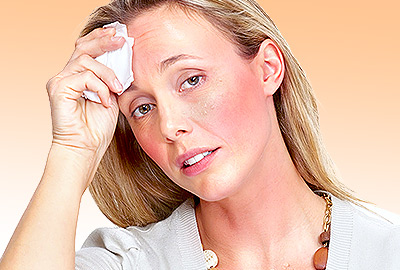Hot flashes are just one of the symptoms of menopause that affects the majority of women during the transition. During a hot flash episode, a woman's pulse races, her skin reddens, and she might even sweat profusely. Although preventing a hot flash episode is difficult, there are several ways of reducing their severity.

Today, hormone replacement therapy is often criticized and instead, lifestyle changes combined with herbal medicines are considered the best way of beating menopausal symptoms.
Hot flashes are caused by the hormonal imbalances that are common during menopause; when estrogen, testosterone, and progesterone levels begin to fluctuate wildly. It is therefore important to maintain a normal hormone production and lead a healthy lifestyle.
How Can I Prevent Hot Flashes during Menopause?
The first thing to do when approaching menopause is to check whether your lifestyle is as healthy as it can be. Leading a happy and healthy life is vital for keeping hormone production as balanced as possible and ensuring that your menopausal symptoms remain infrequent and mild. Making simple changes to your daily routine can control hot flashes and will help to rebalance your body system.
According to the experts, lifestyle changes can be condensed into four main points. Learn how you can prevent future hot flash episodes:

Diet triggers. There are certain foods and drinks that should be avoided because they can trigger a hot flash. These include: alcohol which makes you dehydrated, caffeine which makes your heart beat faster, and spicy or hot food which heats the body unnecessarily.
Ice water. Keeping your body cool is important for maintaining a body temperature that will minimize the frequency of hot flashes. Smoothies can have a similar effect, and will additionally help provide your body with plenty of nutrients.
Exercise. Exercise is often suggested as the best way to prevent hot flashes. Increasing blood flow, improving circulation, and maintaining muscle health. Try to get at least 30 minutes of aerobic exercise a day.
- De-stress. Stress is one of the main triggers for hot flashes. Finding the time to de-stress is vital if you want to prevent uncomfortable sweaty moments from occurring. Get a massage, join a yoga class, or just enjoy an evening spent reading.
Recommendations
Making healthy lifestyle changes is often considered to be the best way of treating and preventing hot flashes. Although it requires dedication, the results will be worth it.
Sources
- Sikon, Andrea and Holly Thacker M.D. "Treatment for Menopausal Hot Flashes". Cleveland Clinic Journal of Medicine. July 2004: 71 (7).
- "Hot flashes ... in January". Canadian Medical Association Journal. 2004: 170 (1).
- Miller, Heather and Rose Maria Li, M.D. "Measuring Hot Flashes: Summary of a National Institutes of Health Workshop". Conference report. Mayo Clinic. June 2004: 79.



